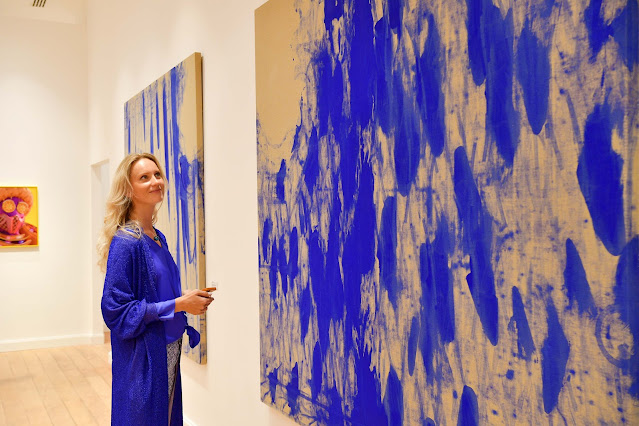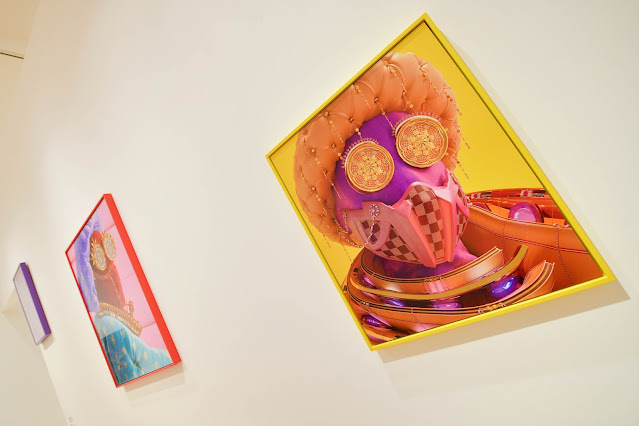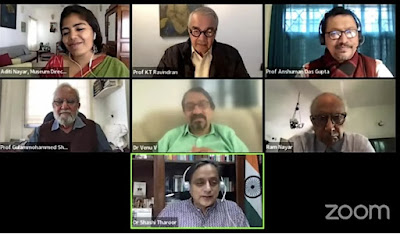In the pleasant urban neighbourhood at the City Walk, Dubai, the inaugural exhibition <I'm not a Robot> explores the nuances of the in-between where the digital and the traditional meet. Edward Gallagher, the Director and Curator of Galloire Art Gallery, presents six renowned artists from across the globe who are ingenious in their chosen field. The exhibition that opened on 8 Feb 2022 has works by Daniel Canogar, Jonas Lund, Addie Wagenknecht, Xavier Sole Mora, Jonathan Monaghan and Anne Spalter. The works displayed range from real paintings to AI (Artificial Intelligence) programmed and collaborated works, from virtual reality to Non Fungible Tokens (NFTs).
Almost all the artists have developed a unique algorithm for their works that have helped their insignia. They also have an interdisciplinary approach. All of the artists point towards a technology-driven future and the many facets of consumerism that affect our day-to-day lives.
 |
| Galloire Art Gallery |
The Artists and The Works
Daniel Canogar
Canogar’s works seek audience participation and multiple perspectives. The two works – Loom and Amalgama are fine examples of how our day-to-day engagement with technology is used in creative ways of art-making. The screens are placed like sculptures. The colourful stripes passing through Loom remind us of the warp and weft of the textile as if weaving is in progress while we catch some phrases in between. They happen to be the day’s top five Google searches and it is those searches their order which gives colour to the moving stripes. In Amalgama, the best 500 artworks that start from Renaissance to Contemporary art are morphed into fluid forms or organic abstractions where search data is used for artistic reinterpretations of electronic information. Canogar embraces technology and draws inspiration from them to satisfy his creative outpour. He also mentions that our lives are interlaced with technology and a future without its existence is unthinkable.
Memory and loss are constant reminders in Canogar’s works. They involve in the stimulation of our senses by actively participating in his works by touch, by google searches and generated data, by movement, or by mere presence of our body temperature. They react in real-time to different data sets. Our movements are choreographed in a way that adds life to his works as in Dynamo, a site-specific audio-visual installation in the Atrium of the Spanish Pavillion at Expo 2020 Dubai. Anyone who has visited the Spanish Pavillion wouldn’t miss it. Peoples’ movement – physical and virtual, is a crucial component of his works.
 |
| Daniel Canogar's works - 'Loom' and 'Amalgama' |
Jonas Lund
Lund is a Swedish conceptual artist who critically engages in the networked systems, the power structure and commercial culture. Presenting a set of parameters, his works usually need viewer involvement. Lund investigates issues related to the increasing digitisation of contemporary society through the means of intellectual property, participation, and authority. He explores the complicated relationship between art and commerce. There is a game-like structure, a playfulness to his style. Lund is at once criticizing and taking advantage of the technological evolution as his works are redesigned and rearranged as a commentary on the current system and practices.
The gallery has displayed two abstract works of Lund. They are mosaics of his successful artworks that had performed well in auctions. Each work records the performance metrics and is with inbuilt near field communicators that give meta-narrative about the painting’s life to the viewer who places the phone near the canvas. It also takes you to a special portal as a collector where you can have chat and interconnectivity with other collectors of Lund’s works. Technology and art connect a community. One of his works is the only NFT in this exhibition. Since we mention NFT, Jonas Lund has his own cryptocurrency, the Jonas Lund Token (JLT) that has a worldwide community of its own.
 |
| Jonas Lund's Untitled |
Addie Wagenknecht
Wagenknecht’s Alone Together series and Ghost series uphold female presence while being absent. These works are strong reminders of where we as women were and are. Wagenknecht’s take on Yves Klein’s “human paintbrushes” in his *Anthropometry paintings is absolutely stunning and noteworthy. She in turn avoided the display and made a negative space of her reclined nude, a deviation perhaps from the classic odalisque. The painting is technically assisted by a Roomba with a custom algorithm that helps it to navigate around her body until the whole canvas is mapped with Klein’s Blue. The result even when it’s a void “serves to evoke the duality of being invisible while simultaneously claiming presence.”
Ghost series refers to the modern-day slang where a person disappears without explanation in the dating environment after a short stint leading to confusion and disappointment. The hope, the temporary highs, the leading negotiations, and the final vanish are documented through still life-like images of flowers veiled in tulle and organza showing different stages of progress from hope to disappointment and to renewal.
The female lens through which the subjects and situations are examined is what adds to its beauty.
 |
| Victoria admiring Addie Wagenknecht's 'Self Portrait - Snow on Cedar' |
Xavier Sole Mora
Intensely influenced by Goya, Xavier’s works explore the playfulness and viciousness side by side. A satire on the violent, grotesque and dark world with a fresh impishly nasty perspective, Sole Mora engages the audience verging on the absurd. The theme of good and evil, power-play bordering on cruelty making it tempting and voyeuristic through seemingly naive setups are his insignia. As an artist, Sole Mora’s practice explores the possibilities of technology such as virtual reality, augmented reality and artificial intelligence to create narratives around social commentary.
The work in the experience room of Galloire, the Golden Feast is a revisit on Goya’s Fool’s Folly from his series Disparates. The etched bulls are here replaced by floating golden hippos that keep bobbing in the air like balloons. A dangerous animal, the deadliest land mammal, is made playful and borders on the comic as virtual reality take us to a farcical land.
In virtual reality and video work, Sole Mora examines our guilty pleasures and our ability to indulge in them. The artist has glamorized the hippos by displaying them in an all-golden hue. As we put on the VR, we are transported to a world surrounded and threatened by the golden hippo presenting a dream-like state. Sole Mora plays with the sense of threat and the beauty assigned to the hippos; the stark contrast of things provoking us to “enjoy” what actually is unenjoyable.
 |
| Slava Noor, Founder and Editor of Arte & Lusso experiencing Xavier Sole Mora's virtual reality 'Golden Feast' |
Jonathan Monaghan
Drawing inspiration from a wide range of areas from art history to video games to contemporary materialistic culture, Monaghan produces fantastical, candy-colored and otherworldly realms. They provide critical reflection as it examines and uncovers unsettling anxieties associated with technology and consumerism perhaps indicating a bionic future. He creates new mythology for a contemporary society based on technology and materialism.
Monaghan’s two works, Soft Power I and II, replicate aristocratic and royal portraiture and are embellished to the point of being dramatic – portraits of ominous figures. One can observe the signs of the corporate logos and consumer electronics of modern-day also reminding us of pop art, in a blend of his own. It may very well signify our current pandemic state with the face covered in velvet masks evoking us of a Baroque aesthetic with its pomp and grandeur. The portraits are a study of power in the digital age. In the Alien Sofa I (series- A Trace Left by the Future), the real and the artificial seem to fade in ambiguity. The compositions are so textured that it plays with the sense of touch but the reality is otherwise. Again, the real and the artificial worlds collide; Monaghan seems to love to toy with that idea and offer a dystopian (or is it utopian?) glimpse.
 |
| Jonathan Monaghan's works Soft Power I, Soft Power II and Alien Sofa I |
Anne Spalter
Anne Spalter is an academic pioneer and a digital mixed media artist. In her artistic process, Spalter synthesizes a consistent set of personal symbols with traditional mark-making methods and innovative digital tools further combining AI algorithms with oil paints and pastels to create her unique and incredible works.
Spalter presents a surrealistic landscape in Lost Signals, a video loop and two of her pastel on paper works that abound in personal symbols even while striking a chord with the collective unconscious. The works are AI-generated and combined with traditional media integrating art and technology. One can see the use of light and lighthouses, an interest in signaling as a form of communication, as a warning and the connection that ensues through portals. There’s a sense of spiritual lacing with lighthouses as anchors that guide the wayward travelers, cautioning and communicating to them to be careful, all the while shedding the light and Spalter exploring that base. Again, this work is quite meditative to an observant viewer and deals with subconscious layers. Lighthouses and water are common themes and symbols in Spalter’s works.
 |
| Anne Spalter's work 'Electric Pathway to the Lighthouse' In the background, Addie Wagenknecht's 'Ghost' series |
You can also find an incredible code poem by Kenny R Brown.
At a time like the present when we are badly hit by the pandemic and when physical communication has been curbed, where our life is lived through digital screens, reminding us of the impact of technology and the reliance on it 24x7, this exhibition raises pertinent questions and becomes more prominent. Technology is advancing at such a pace that there’s no discerning as to where it will take us. It is not only forecasting but also generating and establishing a future.
<I am not a Robot> will run until 28 Feb 2022 at Galloire Art Gallery, London Street, City Walk, Dubai. You can also view the works via the gallery’s website https://www.galloire.com/
It is always better to see such exhibitions in person. Do visit the gallery and experience the show. Addie Wagenknecht and Daniel Canogar happen to be my personal favourites. Who are yours?
Thanks to Slava Noor and Edward Gallagher for the invite.
*Anthropometry paintings are paintings where Yves Klein dipped nude women in his patented International Klein Blue paint in front of an invited audience along while the musicians played Klein’s Monotone Symphony – a single note played for twenty minutes followed by twenty minutes of silence.










